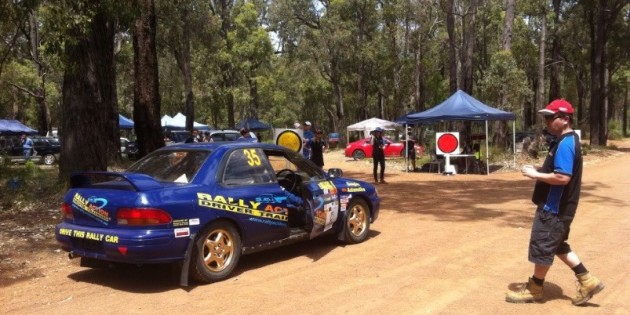Here’s ten tips that can make it much easier for you or your crew when competing in a rally.
1. Make a check list and tick off items as they are completed or packed.
On any rally there is a lot to think about before you get to the start line. Having a list and checking it as you go can save missing a crucial item that you need. Discovering you’ve forgotten the wheel nut socket when you’re on the side of the stage with a flat tyre is never a good look.
2. Take plenty of fluids with you to drink and have a way to secure them safely inside the cabin.
Some competitors take no fluids in the car with them at all, or take water bottles and just throw them behind the seats or in the back. Dehydration and heat stroke are very serious, particularly on the warmer events. Mild symptoms include loss of concentration and headaches, not good when competing. Loose items become missiles inside a rally car. Secure everything well or consider using hydration packs that can be tied to the roll cage behind the seats. The benefit is that you’ll have a couple of litres of fluid available, you can run the pipe up to your harness or seat so you don’t have to get out to have a drink and it won’t be rolling around getting hot and dirty on the floor of the car.
3. Take a jacket with you in the car on cooler events
Forecast shows rain or it’s going to be cold. So what? You’ll be warm and dry inside the car, that’s a problem for the service crew. What happens if you break down or crash in a stage and you have to stand around outside for a while? Race suits may seem warm, until the temp is cool and then they don’t offer as much insulation as you may think.
4. Take a torch, a spare watch and a calculator in the car
Even on daylight events, a torch may help if you have to look into dark corners. If a map light fails, having a small torch works wonders to allow you to keep reading the notes. Watch/phone batteries do go flat and a back-up could save you booking in at the wrong time and gaining a penalty.
5. Carry side cutters (wire cutters) & tyre pressure gauge
You may need to cut cable ties or something more substantial. Having side cutters handy really helps out. Even though you may set the pressures before leaving service, tyres warm up during liaison even within a couple of kilometres. A quick check before you book into a time control could give the car the right handling and grip for the conditions.
6. Arrange and organise your tools so they are easy to access
We’re not talking about the tools left back in the service park (although having them sorted helps a lot too). We’re more interested in what’s in the car. Losing 2 minutes searching for the right size spanner or socket is going to be near on impossible to make up on the next stage. A few minutes sorting your tool kit before the event starts makes things much faster, should you need it. Think about using a socket rail to keep your sockets together instead of floating around loose in the tool box. Don’t forget to back spare fuses, some clean rags and cable ties too.
7. Practice changing a tyre as if you were on a stage
An often overlooked item. When the clock is ticking, you need to sort a problem as quickly as possible. Simply practicing a tyre change under rally conditions allows both of you to know which jobs to do, where the tools and jack are and how quickly you can achieve the task when the chips are down. It’s like a first aid course, you know it and have practiced it, you just hope you don’t need it.
8. Check intercom compatibility between driver/co-driver before the rally
This item comes up often on rallies. Changed, helmet, intercom, car, driver or co-driver? A quick call before scrutineering may save the grief of an incompatible intercom. There’s many different brands out there and it’s not a case of one size fits all. Trying to compete without an intercom is no easy feat and costs a lot of time.
9. Test your intercom before the rally starts
Getting to the start of the first stage and realising you left the intercom turned on after the last rally and you have a flat battery is a drama. A quick check at scrutineering when you’re both together with the car will help. If your intercom runs on a battery, take a spare with you too.
10. Check and inspect your tow/service vehicle and trailer
So much time is spent getting the competition car ready, the tow car and trailer have taken a back seat. Make time to at least check everything over. You’re most likely going to travel a long distance to a place where replacement parts are not easy to find, especially in the dark on the side of the road in the pouring rain. Lights, brakes and wheel bearing failures are common on trailers. Check the spare tyres on the tow car and trailer too.

Leave A Response